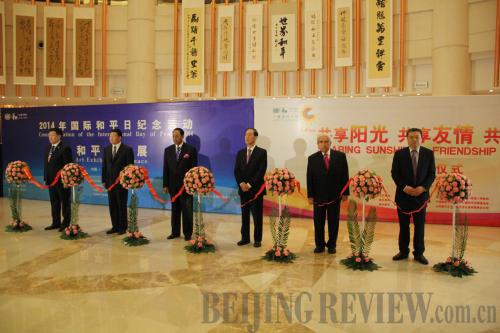|
 |
|
PEACE FUND: Participants attend the launching ceremony of a charity project called A Ray of Sunshine in Xi'an, Shaanxi Province, on September 22, before holding the forum commemorating International Day of Peace (CHI WENSHU) |
The establishment of the European Coal and Steel Community more than 60 years ago contributed to the birth of the EU, which guaranteed the long-term peace in West Europe after the two world wars in the 20th century. The EU thus was awarded the Nobel Peace Prize in 2012, in part for its efforts to overcome economic struggles and social unrest in the region.
However, in Asia, since the end of World War II, while boasting rapid economic development, regional countries have dragged their feet in security cooperation. Along with intertwined territorial disputes, Asian countries are also commonly faced with increasing non-traditional security threats from natural disasters, religious extremism and international terrorism. But in the face of these challenges, Asian countries are basically self-reliant due to prevailing doubts and misgivings about others. Now, China is seemingly assuming the lead to change the situation by promoting the "One Belt and One Road" (namely the Silk Road Economic Belt and the 21st Century Maritime Silk Road) initiatives and a new Asian security perception.
At a recent forum commemorating International Day of Peace in Xi'an, in northwest China's Shaanxi Province, Asian thinkers explored and discussed ways of solving security problems in Asia through regional economic integration and exchanges as well as mutual learning among Asian cultures.
A new type of security
The new Asian security perception was first proposed by Chinese President Xi Jinping at the fourth summit of the Conference on Interaction and Confidence-Building Measures in Asia held in Shanghai in May. In the meeting, Xi stressed that China will work with all parties to propose a common, comprehensive, cooperative and sustainable Asian security outlook, which constitutes the basic features of the new Asian security perception.
"Though there are different security systems in the region, a broadly representative one covering all Asian countries is still absent," Yang Xiyu, a senior research fellow with the China Institute of International Studies, said at the forum.
Yang commented, "The current security frameworks in Asia were mostly established during the Cold War era and feature military alliances such as the two bilateral alliances between the United States and Japan and South Korea.
However, Yang noted that such military alliances are zero-sum structures as when members of the alliances feel secure, their targeted countries will feel threatened and rearm themselves, resulting in a new security dilemma.
Akkan Suver, President of the Marmara Group Foundation of Turkey, claimed that no country will feel secure on the basis of others' insecurity.
"The once-vast world is now a global village as a result of globalization," Suver said at the forum. "Interdependence wields great importance, and states are made inseparable from each other. In this environment, any kind of political, economic, religious or ethnic conflict has a great potential to spread to other parts of the globe. Therefore, the international community must come to a common understanding in order to cooperate against potential threats that undermine global peace."
Under such circumstances, Yang told Beijing Review, a top-level design is needed in building a new and common security framework to address traditional and non-traditional security problems based on dialogue and the consensus of regional countries.
| 